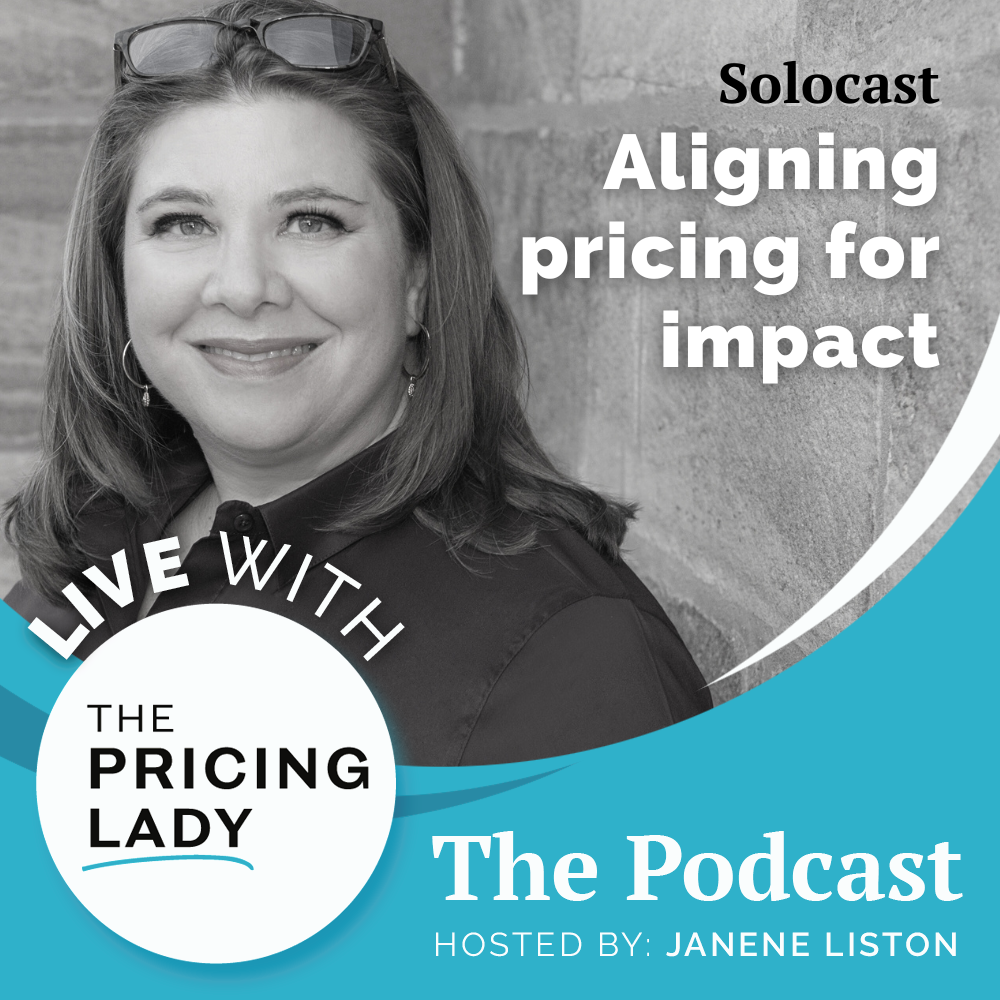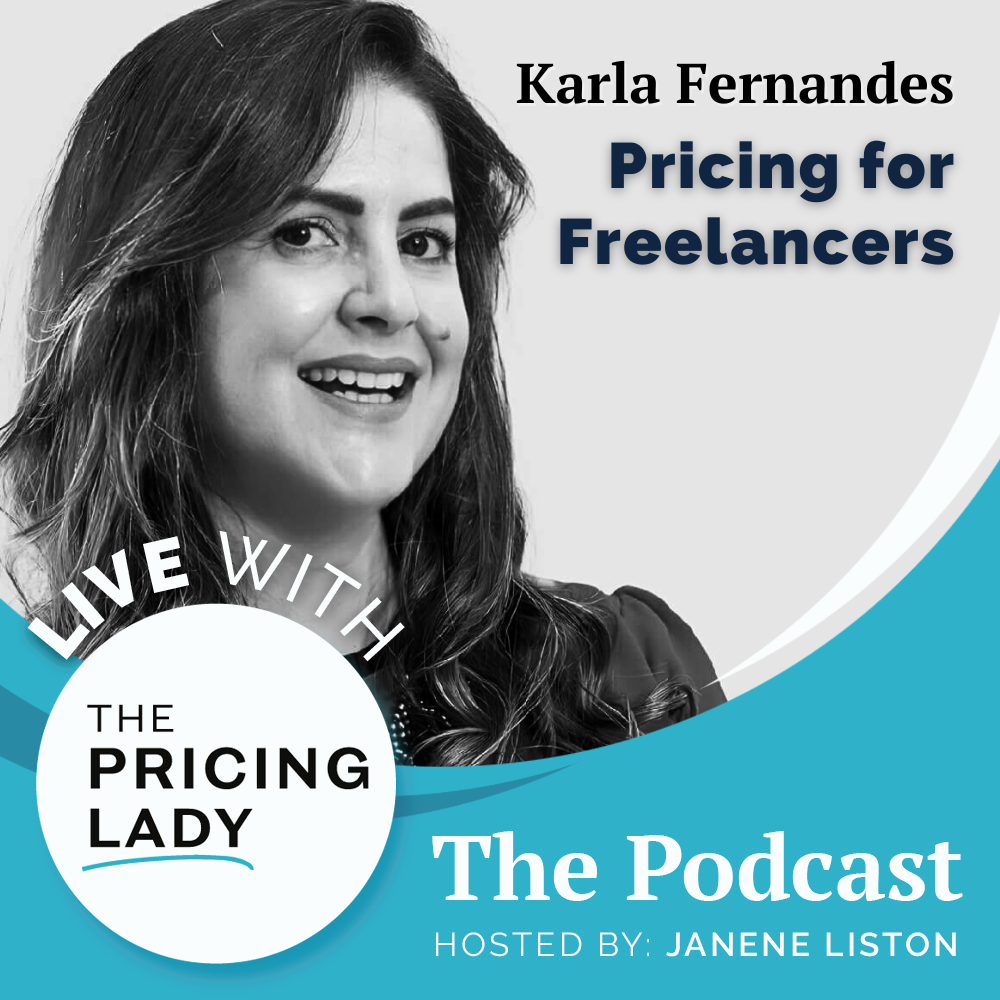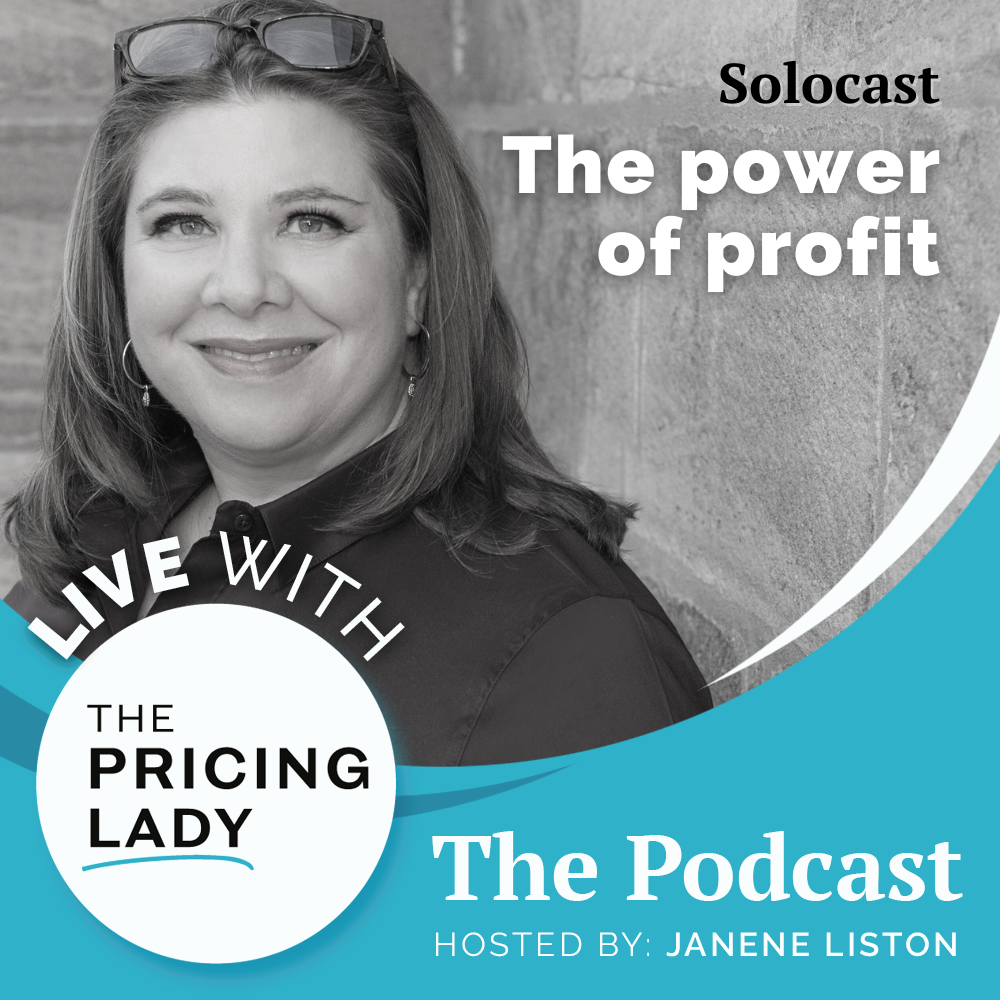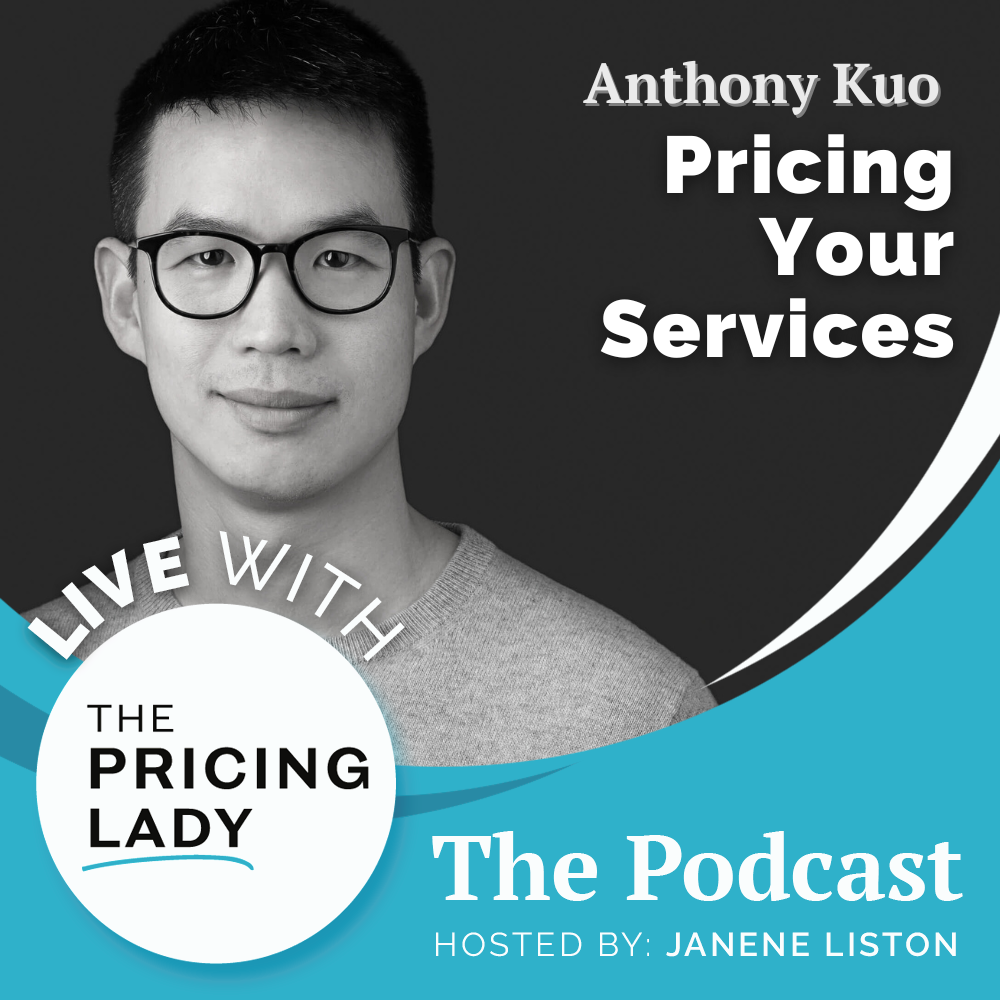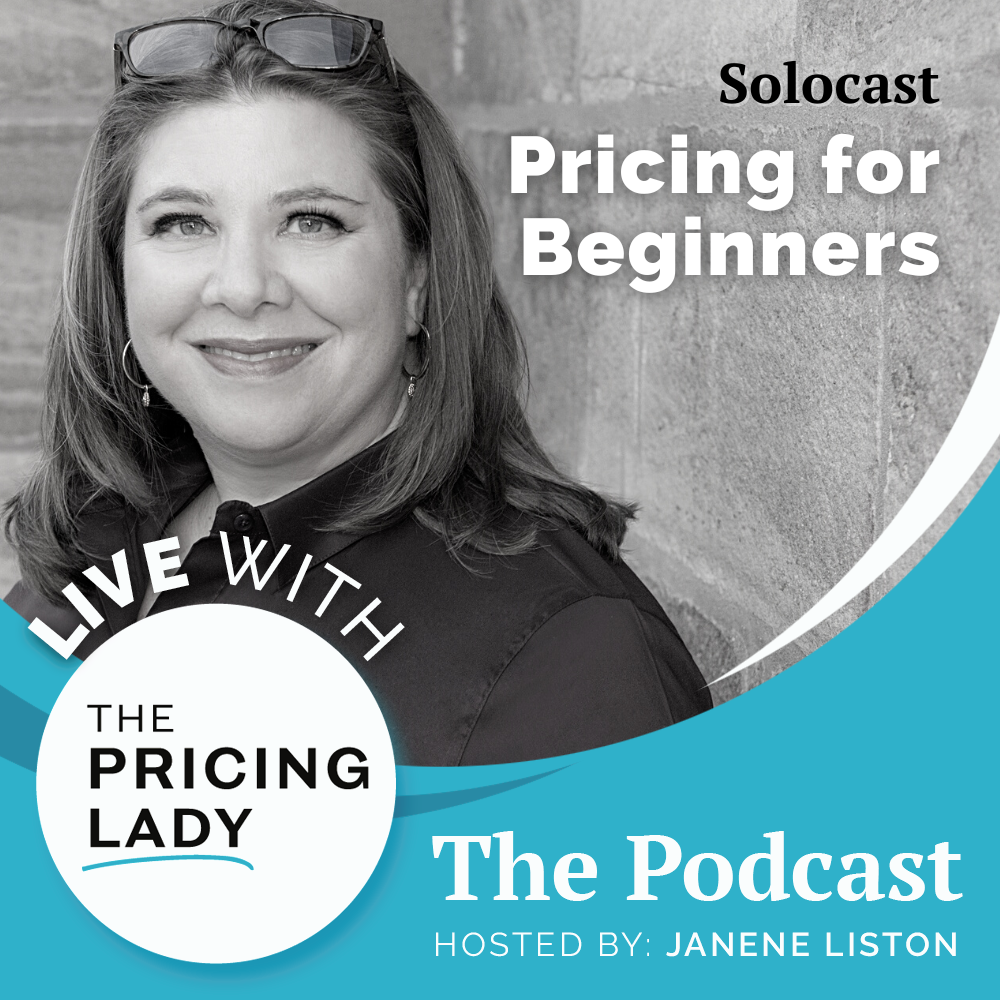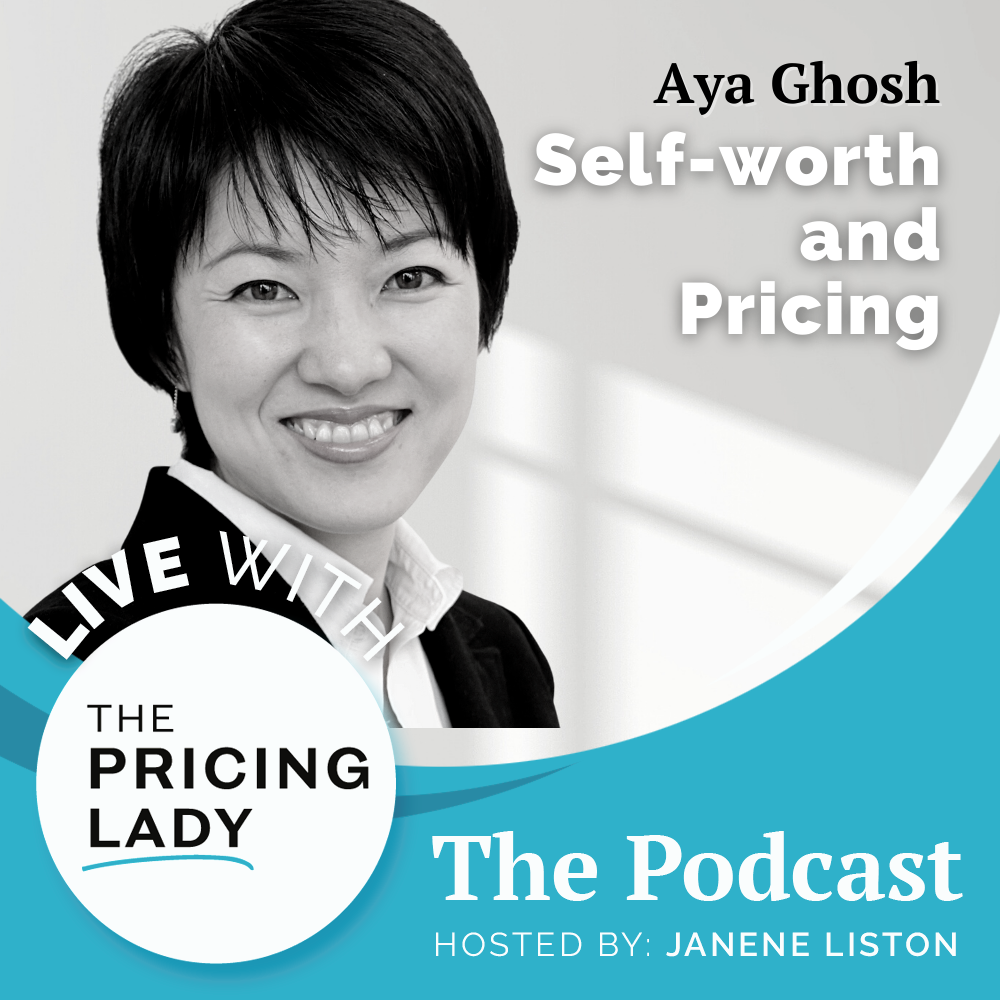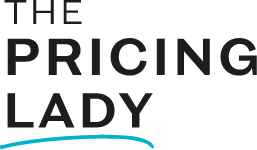There is no doubt about it that to succeed in your business you will need to embrace a profitable pricing mindset.
But what is that and what keeps people from having it?
Pricing and mindset are linked. You can know how to set prices but if you don’t believe you deserve them you will sabotage yourself along the entire journey. It will be so much more difficult than it needs to be. As you may have heard from me and many of my guests on this show starting your own business is a personal development journey. One that constantly takes you outside your comfort zone.
As we all know when you’re outside your comfort zone is when your mind does things to “help” you not feel pain, get hurt or be “unsafe”. But the way it goes about it doesn’t always help in the end. In fact it can hold you back. We’ve all experienced it. And that’s why I’m so excited to have had this chat with Jen.
She encourages you to recognize and challenge your limiting beliefs in order to achieve your goals and build a sustainably profitable business. Many of us are taught to play small and not value ourselves, which can make it difficult to charge what we are worth. But, setting prices that are too low can actually lead customers to perceive us as having low value. Therefore, it’s important to set prices that reflect the value of our work.
In This Episode
Jen Gutfriend, a mindset and business coach/strategist and owner of The 6 Figure Female Entrepreneur, shares her journey of overcoming limiting beliefs around money and success and how she helps other women achieve financial freedom while working less. The key takeaway? Mindset is crucial for pricing success.
Discover how Jen navigated the challenges of setting her initial prices and how she gradually increased them based on her expertise, results, and client satisfaction.
Get ready to transform your mindset and embrace a profitable pricing mindset that propels your business to new heights.
Enjoy the episode!
Podcast Episode Highlights
- 0:00 Intro
- 2:17 Getting to Know Jen
- 3:16 The Value Jen’s Clients Get
- 9:39 What Led Jen to Start Her Business
- 12:33 Pricing at the Beginning
- 16:48 Challenges of Providing Affordable Services
- 19:42 Pricing Tips and Strategies
- 26:09 Wrapping It Up
Favorite Quotes
“The belief that you’re worthy of that amount of money is one of the biggest blocks I see when it comes to setting prices in making money as a female entrepreneur.” Jen
“Saying, oh, but just, or, oh, I can’t, or I’m only like, those are indicators that you have a limiting belief that’s telling you that this is enough. And this is gonna affect you because as long as you have them, you are never gonna allow yourself to charge good amounts of money, receive large amounts of money.” Jen
“As women, we have a big block around receiving, most women, because we’re always told we’re the givers. We’re supposed to be giving and giving and giving. We’re not supposed to be receiving. Like if you can’t receive gifts or even receive a compliment, how do you expect to receive large amounts of money in your business?” Jen
“If you’re a little afraid of setting your price at that price point, then that’s good. If you’re really afraid, then that’s maybe a little too much. But if you’re not afraid at all, then you’re not charging enough.” Jen

“The better you get at receiving a compliment or receiving anything, the better you get at receiving money. Because how you do one thing is how you do everything.” Jen
“When you have offers at different value and price points, then when someone says, oh, that’s too expensive, you actually have a really lovely way to navigate that conversation without going on the defensive.” Janene
“As long as I believed I wasn’t worthy, I wasn’t gonna allow those good things into my life. Being able to overcome that and actually live a life I’m happy with is the most amazing thing I could do.” Jen
Episode Links
Reach out to Jen:
LinkedIn: https://www.linkedin.com/in/jen-gutfriend-024224197/
Instagram: Instagram.com/the6figurefemaleentrepreneur
Facebook: Facebook.com/the6figurefemaleentrepreneur
Podcast: The 6 Figure Female Entrepreneur
Jen’s Book Recommendation: The Big Leap by Gay Hendrick
The Fair Price Formula: Next cohort starts soon. Join me, Janene, and learn how to set prices for your business.
Rate, Review and Follow the Show on Apple Podcasts
“I’ve just found my Pricing Resource!” … “A binge worthy podcast.” … “I learned so much about how to improve my profitability.”
If that sounds like you, please consider rating and reviewing the pricing podcast. It helps me spread the word to more people and ultimately get more small businesses on the path to sustainable profitability and business success. Click right here, tap to rate with five stars, then select “Write a Review.” Last let me know what you loved most about the episode!
One more thing. If you don’t already, follow my pricing podcast. New episodes come out every couple of weeks, plus bonus episode. If you’re not following there’s a good chance you’ll miss something.
Reach Out, Connect and Book a Call with Janene
Linkedin | YouTube | Facebook | Email List
Get started improving your business. Sometimes it’s difficult to know where to begin. I suggest you Download the the self assessment Pricing Scorecard to get a view of what’s working and not in your business. Also if you’ve ever wondered “What’s a fair price?” then check out my on-demand webinar “Getting to A Fair Price”. Two great places to get started with pricing in your business today.
Get in touch with Janene, your Business Strategist & Pricing Expert. If you’ve got a business question that needs answering, a pricing challenge you’re facing or you have suggestions for future topics or guests, let me know. Your questions and insights often become episodes. Share yours with me and let’s see where it goes. Contact Janene.
Listen up! Don’t miss out. There’s a lot going on and you’ll want to be in the know. Follow my YouTube channel (rate it too please) so you don’t miss an episode of Live with The Pricing Lady or join my Email List.
Transform your business and life. My mission is to help you build a sustainably profitable business. One where you can confidently charge for the value you deliver. Curious about my coaching and consulting offers, check them out. Let’s see how we can work together. Book a complimentary Call
Episode Transcript
Janene: Hello everyone, and welcome to Live with the Pricing Lady. I’m Janene Liston, your hostess. This show is all about helping you build a more sustainably profitable business. By understanding the tactics and strategies of pricing you can more easily find prices that you think are fair for both you and your customers.
Welcome to the show and welcome to today’s guest, Jen Gutfriend.
So, Jen, where are you joining us from today?
Getting to Know Jen
Jen: I’m in Calgary, Alberta, Canada.
Janene: Oh, cool. And it’s very early for you, so thank you for getting up at the crack of dawn and joining us.
Jen: It’s all good. It’s all worth it.
Janene: Super. Jen, how would you describe your superpower?
Jen: My superpower is helping women be the best versions of themselves and helping them achieve their goals with ease so that they can go out and live that dream life that they’ve always had for themselves and dream business as well.
Janene: Super. Excellent. What a great superpower. What’s one interesting thing that most people don’t know about you that you’d like to share?
Jen: I’m a farm girl. Through and through. I was born and raised on a ranch, grew up there, and I’m back in the country again. And that’s the best living you could ever have for me.
I’m not a city girl at all.
Janene: Oh, that’s really cool. Excellent.
And the last rapid-fire question. First, why don’t you tell us about what you do and then what value do the clients get from what you do?
Jen: I’m a mindset and business coach/strategist and a clinical hypnotherapist. I help female entrepreneurs start and grow their businesses to those six figures and beyond, while working 20 hours a week or less.
The Value of Working with Jen
Jen: It’s all about that lifestyle business where you get to enjoy the money you make, so you get to make good money. But you have the time to enjoy it. One of my biggest values is freedom. I had a business in the past where I made decent money, but I was working 50-60 hours a week and never could enjoy that money.
After that time and that business, I really started valuing time and financial freedom both, and I really value that for my clients as well, because nobody started their business to work more and make less. So why not get what we desire?
Janene: Many people have this belief that if you’re an entrepreneur you have to work three times harder as people who have “normal jobs”, to use the phrase, but I don’t think it has to be that way.
Jen: No, it comes from a worthiness piece, especially among women. We are trained from a very young age. I know myself, I heard growing up that hard work equals success. You wanna make lots of money, you have to work hard, you have to put in the hours. You have to do those things.
We take those on as belief systems and values as a way of being. We don’t know any better. Then when we go out and have our own business, we feel like, oh, but it’s our business, so we have to work more and work more and work more. But that’s not really the case. It’s just a belief system and a limiting belief that’s telling us in order to be worthy of making all this money, we have to work hard for it.
Janene: Those core beliefs are a real kick in the pants, aren’t they?
Mindset is so Important
Jen: Oh yeah. They can be. The difference between having a six figure plus business and not being able to make any money, like those core beliefs, those limiting beliefs that we have literally help us become who we are, show up in our world and help us be who we wanna be.
But they also stop us from being who we wanna be. So if we can’t achieve our goals, it’s because we have a limiting belief or a belief system going on that says, For some reason that’s not available to me. And then you self-sabotage and you do things to get in your own way.
Janene: Yeah. We just started my cohort of the fair price formula yesterday and we were talking about the five steps to pricing success.
Two of them are supporting what I call foundational elements. One has to do with mindset. And I was like, you can know everything. You can know how to set and how to get and how to manage them. But there in the background, if your mindset, if you think I can’t do pricing ’cause I’m bad at math, then you’ll struggle with set and get and manage even though you know how and what to do there.
Mindset is so important.
The Belief that You’re Worthy
Jen: I find with 95% of women in the world and a 100% of the clients that come work with me, the belief that you’re worthy of that amount of money is one of the biggest things I see when it comes to setting prices in making money as a female entrepreneur.
As women, we live in a world where we are given so many poor programs, like, you have to be skinny and you have to look like this model. We have all these negative belief systems going on around us. Then we have our parents who grew up in an era where women were still technically property.
They were just coming out of that era. Women didn’t really have rights. There was no equality. We have that then being passed down through to the generations just by the way our parents act. My mom was a stay-at-home mom, and in her mind, I should have been a stay-at-home mom.
I should have just been focusing on finding a husband, raising babies, and taking care of my husband, and why are you even worrying about a career or going to school or having a business? We have those programs sometimes on purpose, and sometimes we don’t even know they’re there that tell us, well, you’re not worthy of lots of money.
And if we have that belief system, I had it. We don’t allow ourselves to charge good amounts of money. We don’t allow ourselves to receive good amounts of money, and we make it really hard to even increase our prices because it’s like, well, I’m a woman who’s gonna pay that, or, I’m just this woman, why would someone pay me for my services?
Limiting Beliefs
Janene: Yeah. That word justice, an amazingly powerful word. It is usually also very diminishing in its power. I hear that all the time. I’m just a coach or I’m just a this or it’s just that. It really has an influence and from my observations with clients as well, it tells me a lot about how they feel about that worthiness piece.
Jen: It does. As soon as someone adds that just piece into a sentence, they’re diminishing themselves. They’re pulling themselves back. They’re playing small. It’s even a notice of people like notice are you saying, oh, but just, or, oh, I can’t, or I’m only like, those are indicators that you have a limiting belief that’s telling you that this is enough.
And this is gonna affect you because as long as you have them, you are never gonna allow yourself to charge good amounts of money, receive large amounts of money. Cuz it’s not always the charging. As women, we have a big block around receiving, most women, because we’re always told we’re the givers.
We’re supposed to be giving and giving and giving. We’re not supposed to be receiving. Like if you can’t receive gifts or even receive a compliment, how do you expect to receive large amounts of money in your business?
A Big Indicator
Janene: Amongst my friends, sometimes I gained a reputation, like we will be in a group and one person will say something nice to the other one and they’ll be like, oh, well, you know, I just did da da da, and I’m the one who’s like, excuse me, you should just say thank you.
Jen: I appreciate that. Thank you. Don’t have to reciprocate it. You don’t have to explain it. This old thing, like as women, we’re just so bad at it. The better you get at receiving a compliment or receiving anything, the better you get at receiving money. Because how you do one thing is how you do everything.
These limiting beliefs tie to all areas of your life. So really pay attention to how you’re acting around friends and other areas of your life, because it’s a big indicator how you’re gonna act in your business.
Janene: Yeah, that’s very true. Jen, I’d like to go back to the beginning when you first started your business, what led to that for you?
What Led Jen to Start Her Business
Jen: I’d had a business in the past and because of all my limiting beliefs, I had ultimately led to burnout, like full on health crisis. I couldn’t function anymore. I had to close down my business and walk away. But I’m a very motivated, very driven woman. I knew that there was a reason behind this, and I was like, I was gonna get to the bottom of why this happened no matter what.
That got me into personal development, which wasn’t something I was really familiar with back in the time, this is about 10 years ago now. I kind of dove into personal development, started really digging into different books, working with coaches, and that’s when I discovered this mindset piece.
And how important our mindset was. And that’s when I discovered that I didn’t feel worthy at all of anything, any good things in my life. I’d created a limiting belief at only two days of age that told me, you’re not good enough. You’re not worthy enough of good things in your life. And I just accepted whatever was given to me.
It’s like, oh, well, I’m not deserving of good things, so I guess I’ll just take this. That kept showing up in my life along with those money blocks around you have to work hard for money. That’s why I was working the 56, 56 hours. At first business was easy and my mind goes, But it’s not allowed to be easy, so it’s like you have to make it harder so that you’re worthy of and deserving of it.
Awakening Call
Jen: All of this, in this awakening I call it, I started seeing so many other women with the exact same struggles. As I overcame these and started really transforming my own life, I realized that I wanted to help others do it because ever since I was a child, I’ve had a passion for helping people.
But a farm kid in rural, you know what? Mountain country? There weren’t many psychologists. There wasn’t that type of role model. I didn’t even know as a child that I could make a living helping people. And this was way pre-internet era, so it wasn’t really a possibility back then. But then suddenly, the internet age is here and online businesses, and I’m thinking, I can make a living helping people, like making a difference in this world, and people are gonna pay me for that.
I’m like, oh my God, this is the best thing ever. I literally just wanted to share my knowledge and if I got paid to do it even better. I started it as a side hustle while I was working a full-time job. And I just seen what an epidemic it was that I wasn’t the only woman struggling with this.
Pretty soon success because I’d worked through all the limiting beliefs and done the mindsets that work, it got to be easy this time around. I got to allow myself to let success be easy, making money be easy. And sharing my knowledge and it just was a completely different experience the second time around.
Pricing at the Beginning
Janene: Amazing. One of the questions I like to ask people on the show is that first time that you sat down in your business, and you had to set a price, what was that like for you?
Jen: It was still nerve-wracking because even though I’d done the mindset work, there was still, we always have different layers to our mindset beliefs.
There’s still other things going well, will people pay me to help? And this was early in the online coaching industry. I’ve been in this business for a while, and it was still like, okay, well what will people pay? Will they pay this amount of money? But I don’t wanna undercharge myself, like I wanna at least make what I made in my corporate, otherwise what am I, what I doing?
And right, well, what do I think is valuable? It was like this constant back and forth. It was like this internal mind chatter going on, going, what do I do? What do I do? And then, it was just kind of, I started off going, okay, what would I like to make per hour? What do I think is a reasonable amount?
Building Experiences
Jen: How many hours in my coaching per month do I think I’m gonna work with this person? And then I just kind of used that to go, okay, this is what I’d like to charge. This is how many hours? I think. This is my monthly package. I just knew that this was just a starting point and I could always increase.
I always said that. Every few customers as I’m building my experience and getting better. I’m just gonna increase my price. That’s what I did is every few customers I did that, it’s like, oh, my clients are getting results. They’re happy with it, so I’m gonna increase with the next customer.
Like every couple, throughout my journey, I just kept increasing a little bit, a little bit, a little bit till I got to a price where I was really happy with what I was charging.
Janene: I think a lot of people think you can’t do that.
Jen: I understand that they think, and I did in a way too.
I’m like, well, how, what do I do then? How do I charge this person this much? But then the next person, the next much. But the thing is, there could be months between this person and that person, and I’m so much more knowledgeable and I’ve got more results because it’s not just about our knowledge base, but we’ve got those testimonials.
Moving It Up
Jen: Now we’ve gotten results for our clients, and that makes us more valuable. Plus, most of the time we start lower than we really should as women charging. We really need to be moving it up to get to even an industry standard, because I know. I didn’t wanna charge too low because I knew from my years in corporate and from being an entrepreneur before that people don’t value cheap.
I couldn’t come in as the cheapest because that’s a mistake I know a lot of ladies make. It’s like, well, but if I’m the cheapest, then people will wanna hire me because I’m the cheapest option. But I know myself and I know others. We have this belief system around cheap.
If it’s the cheapest, we perceive the value as cheap because, well, why is it the cheapest? Why is she charging so low compared to this person who’s maybe even double and a person will go pay double? Because sometimes people value price as a direct correlation of value. So in a way, you can’t be too low.
That was the thing going on in my mind is I can’t be too low, or people aren’t gonna value what I do. They’re not gonna do the work because when I was doing my training to become a coach, I was doing free sessions and of course when you do free, people just quit showing up. They’d show up for the first few, they’d get great results, and then people just self-sabotaged and didn’t show up.
I’m like, I have to charge enough where people are gonna actually have skin in the game and show up, but they’re not gonna feel like, oh my God, it’s too much and not be able to pay.
Fear is a Big Driver
Janene: Another guest I had on the show, I’m thinking, It might have been Heidi Gruss but she mentioned that it should be painful for you and painful for the customer.
I mean, not like agony, pain, but you know, there should be some tension there on both sides and that was her sort of definition of a good price. And I thought that was an interesting definition.
Jen: Yeah, and to me it’s about fear because as humans, fear is a big driver, but a lot of times it’s a fear of, okay, is the fear a good fear of I’m stretching myself, or is it like a limiting belief fear?
I always say, if you’re a little afraid of setting your price at that price point, then that’s good. If you’re really afraid, then that’s maybe a little too much. But if you’re not afraid at all, then you’re not charging enough. So there needs to be a little bit of fear behind it going, okay, yeah, I’m pretty sure people are gonna pay this, but I don’t quite know.
Then you’re probably in that right price point, ’cause if there’s no fear, then you’re definitely not charging enough.
Janene: Another thing that I hear from people a lot is that they want to serve people who can’t afford what they do. I’m curious, I’m sure you’ve run into this along the way, and I’m curious how have you dealt with that in your own business?
Navigating the Challenges of Providing Affordable Services
Jen: I’m big on having a product suite. Different products at different price points to meet people where they’re at, because a lot of us start this journey as one-on-one coaches, one-on-one consulting. Not everybody can afford a one-on-one price. And I tell people from day one, have different alternatives, have other options.
I have programs from $11 to private coaching up into the five and six figures. Depending on where people are at so I can meet them. Maybe somebody can’t join my one-on-one coaching. They can’t afford it, but they can afford my group coaching, which is under a thousand dollars, which is gonna give them all the tools they need to be getting to those six figures and beyond.
So then if they wanna come work with me one-on-one, they then have the money to be able to work with me. We gotta have different entry levels to meet people where they’re at because it’s either they don’t have the money. Or they don’t have the trust in us yet. They need those lower price points to build that trust.
Plus, if you wanna do to help people, like every once in a while I do scholarships. If there’s someone that I really like their energy and I know they’re gonna really benefit from my work, I can give ’em a scholarship and say, okay, it’s only gonna be half the price because I see you’re gonna really benefit from this.
I know you are gonna do the work. You still gotta put some skin in the game, but I’m gonna do it at a better price for you.
Offers at Different Value and Price Point
Janene: I love that. I think I talk about like having these different offers as being able to navigate the conversation as well. When you have offers at different value and price points, then when someone says, oh, that’s too expensive, you actually have a really lovely way to navigate that conversation without going on the defensive. Right. And I think that that’s a lovely tool to have in your kit.
Jen: Yeah. Because price can’t be an issue and it’s not just, I know some people use it as an excuse to get out of things, but sometimes it’s genuinely an issue. And whether it’s an actual issue or people just using it as an excuse, you can then go, oh, well if that’s too much, I also have X, Y, Z program, which I know will fit you.
It’s at this price point. And then that gets you into that conversation and you know right away is it really a pricing issue. Or is it a something that they’re not valuing with you? Is it maybe that it’s not the right fit between you? It allows you that opportunity to further that sales conversation to see what is the real issue.
For coaches like myself out there, it gives you that opportunity to maybe do a little bit of coaching to help people. If there is just a resistance or a limiting belief, you can help coach ’em through it and see that, yeah, this is really gonna help them and help them get the help that they truly need in their business or life, or whatever it is you’re helping them with.
Pricing Tips and Strategies
Janene: Yeah, that’s true. When it comes to pricing and mindset, I’m curious, what tips or strategies do you have or that you could share with us about, you know, some of those mindset blocks that get in the way of pricing and what people can do about that?
Jen: Yeah, so there’s many of them.
And the biggest thing is things like money blocks, self-worth are the two big ones. Who am I? The imposter syndrome’s another big one I see as well. Who am I? That person’s got 20 years of experience. They’ve got a degree. It’s like, yeah, but they don’t have your life experience. You are doing this because you learned something and you overcame something and you did it in a way that worked.
It’s probably gonna help somebody else. The big thing is listening to that internal voice, because a lot of times it’s been so negative for so long, we’ve just kind of tuned it out, or we listened to it, but we don’t notice we’re listening to it. I always tell women, really start paying attention to that inner voice. That negative inner chatter going on in your mind?
Because that’s a window into your limiting beliefs. If you’re always saying things to yourself like, oh, who am I to be charging this? Who am I to be teaching this? Who am I to be helping these people and making this kind of money? That’s probably an indicator that you have an imposter syndrome, limiting belief, or, oh, well this is too easy. Money can’t be this easy. It’s a sign you have a money block.
Listening to that Inner Critic
Jen: By listening to that inner critic and even asking questions like, oh, well why? Why can’t I? Why am I not allowed to make this kind of money? What’s stopping me? Then you start hearing things like, oh, well you’re only a girl and blah, blah.
Cause like, Things like that came up for me. Oh, you’re only a girl. You’re not supposed to be focusing on your career. It starts giving you that window into your soul. Then the best thing is to then get help, because mindset’s a tricky thing and it can be a really hard thing to overcome.
I know from personal experiences, try and then get the support to work through these things, to get the tools, because when you struggle with something, We tend to give up because when things get really hard for too long, we just feel like, Ugh, this is not gonna get better. Why even keep fighting and we give up?
Whereas if you just got a little bit of support to help work through these things, to overcome these things, then you can then just get on with it. That’s the thing with mindset, once you overcome it and work through these blocks, they generally don’t come around again. They may show up in a different way later on. But they’re gonna be gone.
Eliminating Blues
Jen: That’s the thing with the difference between people who are not successful in business and multi-millionaires is multi-millionaires mindset is a core part of their business, right? They just know, like they can easily identify, oh, something’s happening, eliminating blues, getting in my way, something’s going on here.
They get the help, they remove it, and then they just keep hitting that next level. Cause we all have what we call glass ceilings, right? The amounts of money that we currently believe we’re worthy of receiving or that we can allow into our reality. So maybe for one person, that first one is a hundred thousand dollars.
They get to a hundred thousand dollars and then they start hitting resistance, they start self-sabotaging, things become harder. They’re running into this resistance and some people go, oh, I’m just like myself. I’m not working hard enough. I need to do this. But if, you know, it’s just a mindset issue.
You go in, you do the work with somebody you’ll help uncover, well, what is that mindset issue? You remove it, you work through it, and then all of a sudden you’re on your way to 150, 200,000, that next glass ceiling, and these just keep showing up in your business. And it’s just a matter of recognize it and knowing right away, oh, I’ve just hit upper limit, a glass ceiling, working through it, and then getting to the next one.
Right? Whereas if you don’t understand that, you just keep hitting it and hitting it and hitting it. And then sometimes we just give up or we think, oh, this is all we can have. This is all we’re we, can we make in our business.
It Shows Up Again
Janene: Oh, that’s great. It’s funny that you mentioned the inner critic, so I don’t know if you know Tara Mohr and her book Playing Big.
Have you over?
Jen: No, I haven’t.
Janene: One of my favorite books of all times and I found her playing big program, and you can repeat each year when she runs it. We just started last week and this week it’s all about the inner critic.
Janene: It’s like you can, like you said, you work through it in one area and then you may find a challenge again with the inner critic in another area, or the universe has a way of throwing you outside your comfort zone.
In that area where you already worked on the inner critic, but he or she shows up again because you’re further outside the zone than you thought was possible. I think I’ve come to the conclusion it’s one of those things that’s part of life is always working on those things.
Jen: It is. I like to tell people that even when we, through hypnotherapy the one of the modalities I use, we can completely remove a limiting belief. It’s easy to go into your mind, uncover exactly what’s going on, why your self-sabotaging, why you’re getting in your way, remove it. But I like to say limiting beliefs are like a tissue box.
We may have removed that limiting belief where you feel like you’re not worthy of success. But there’s other limiting beliefs that may be tied to that that aren’t showing up yet. we’ve removed that tissue, but then say three months down the line, something happens. You’ve reached a new level, I like to say, new level, new devil in your business.
Moving a lot of Tissue
Jen: That other tissue starting to pop up. It’s like sitting on the edge there, and it’s like somewhat kind of tied to that old belief, but its own new little belief. So then you go in and you have to remove that tissue, and then you have to remove the next tissue.
Sometimes you can, like you’re at the beginning, especially, you’re really having to move a lot of tissue. It’s like having a cold. You’re just constantly pulling those tissues out. You’re like, okay. And then you get to a point where suddenly there’s no tissues for a while, and then you’re like, oh, and you’re in this zone for like six, eight months a year, maybe even longer.
But then suddenly it pops up again. It’s like suddenly you got a cold again and you’re like, okay, pulling a couple tissues out, and then it’s gone. And it’s just this process, right? So even though you’ve removed one belief, there could be other beliefs that are somewhat tied to it or tied to that same story or have some sort of connection.
It’s not that that belief came back, it’s that something else is tied to it and you need to work through removing that. Just know that these things always come up. There’re always different layers to these belief systems. Like I worked through a belief that because I was a woman, I couldn’t be successful.
It was a big thing holding me back. Then recently, this has been coming up again in my life, but around a different scenario around being a woman and being able to be a multimillionaire or multiple six figure earner. It’s just that new issue, that new thing coming up.
The Biggest Thing
Janene: Excellent. I love it. Great conversation. Unfortunately, we need to start wrapping it up. Maybe we’ll have to have you come back on the show so we can dig into this a little bit more deeply sometime.
Jen: I would love that.
Janene: Well, Jen, couple of wrap up questions. What’s one thing you’d like people to remember from our discussion today?
Jen: The biggest thing is you’re worthy and deserving of all the success you desire. And if it’s not working for you, you really gotta look outside of yourself. You gotta look to those limiting beliefs, you gotta look to other things and start understanding why. Listen to that inner critic and see what’s going on, because mindset is a key part of success.
Janene: Yeah. Love that. Thank you. What’s one of the most amazing things that you’ve overcome in your own life, business?
Jen: The belief that I wasn’t worthy of good things. Like I literally held myself back from everything, from success, from making good money, from love, like all those good things that we want in life.
Because as long as I believed I wasn’t worthy, I wasn’t gonna allow those good things into my life. Being able to overcome that and actually live a life I’m happy with is the most amazing thing I could do.
Wrapping it Up
Janene: That’s incredible. What is a favorite book or tool that you’d like to share with us today?
Jen: Oh, The Big Leap by Gay Hendricks. That’s the book that introduced me to the world of mindset, and it’s been around forever and it’s like a staple, but it is like a great read and it’s a great way to introduce people to that mindset world and its importance.
Janene: Excellent. We’ll put that in the show notes, a link to that in the show notes for everyone.
The last question I have for you is how can people reach out to you if they’d like to find out more about you and what you do?
Jen: Yeah, so the best way would be through my podcast. It’s relatively new. And you can find it on all the podcast players, iTunes, all of those at The 6 Figure Female Entrepreneur.
Janene: Excellent.
Jen, it has been a real pleasure to have you here with us today. We’ll be sure to put all your links and important information into the show notes as well so people can reach out. But thank you so much for being here with us today.
Jen: Thanks for having me. I had so much fun.
Janene: All right, everyone, it’s been a pleasure being here with you as well.
I wish you all the best. Have a great day, and as always, enjoy pricing everyone.

